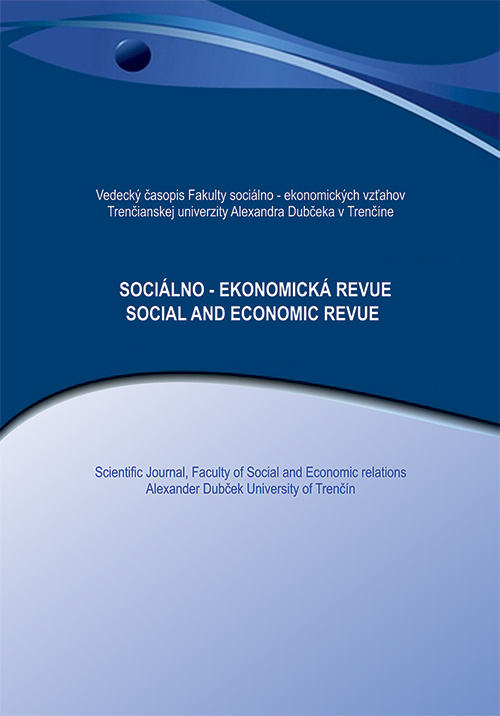ENTREPRENEURIAL MOTIVATION POTENTIAL OF ECONOMICS STUDENTS IN SLOVAKIA: WHICH ARE THE HRM IMPLICATIONS FOR ENTREPRENEURIAL POLITICS AND PRACTICE?
On the sample of N=304 economics students from Slovakia are examined the following entrepreneurship motivation variables: a) professional attraction of entrepreneurship; b) social valuation of entrepreneurship; c) perceived entrepreneurial capacity; d) entrepreneurial intention; e) key entrepreneurial motivators (extrinsic and intrinsic); f) perceived entrepreneurial support; g) perceived entrepreneurial barriers.Obtained results suggest relatively low attractivenes of entrepreneurship profession in relation to the other professional options; average social support in realization of entrepreneurial idea; relatively low perception of entrepreneurial knowledge importance; relatively low entrepreneurial intention; intrinsic motivation factors showed as more important than extrinsic; not perceived any important supportive/logistic to entrepreneurs; predomintly are perceived entrepreneurial barriers. Calculated entrepreneurial potential showed as rather low, what gives HRM implications for entrepreneurial politics and practice.
Release: 2017/2 Pages: 26-42 JEL classification: M5, M51, M52
DOI:
Keywords: motivation variables of entrepreneurship, entrepreneurial motivational potential, entrepreneurial politics, entrepreneurial development, management with motivation factors of entrepreneurship, HRM.
Section: HUMAN RESOURCES AND PERSONNEL MANAGEMENT
Contacts:
Doc. dr. sc. Mario Bogdanović, BA&MSc&PhD Economics, Prof. Psychology, senior research associate
Management Department,
University of Split Faculty of Economics, Croatia
Cvite Fiskovića 5
21.000 Split
Croatia
e-mail: mario.bogdanovic2015@gmail.com
dr. sc. Lara Cakić, Prof. Psych&MSc&PhD in Psychology, research associate in psychology
I. Gundulića 53
31.000 Osijek
Croatia
e-mail: laracak@yahoo.com
Literature:
Azhar, A., Javaid, A., Rehman, M., Hyder, A. (2011). Entrepreneurial Intentions among Business Students in Pakistan. Journal of Business Systems Governance and Ethics, 2(5), 13-21.
Bird, B. (1988). Implementing entrepreneurial ideas: The case for intention. Academy of Management Review, 13(3), 442-453.
Bogdanović, M. (2015). Motivation management in a function of entrepreneurship development, Innovations and entrepreneurship-launchers of development and employment PRECEEDINGS, Faculty of Economics University in Banja Luka, Bosnia and Herzegovina, May 2016., p. 101-113. Paper presented on the 2. International scientific and professional conference Innovations and Enterpreneurship launchers of development and employment, Faculty of Economics University in Banja Luka, Bosnia and Herzegovina, 02. October 2015.
Bogdanović, M., Svržnjak, K., Kamenjak, D. (2008). Poduzetnička svojstva voćara i vinogradara Sjeverozapadne Hrvatske. [Entrepreneurial Characteristics of Fruit and Wine-Growers of North-Western Croatia]. In: M. Pospišil (ur.), Zbornik radova 43. hrvatskog i 3. međunarodnog simpozija agronoma [Proceedings of 43 Croatian and 3rd International Symposium on Agriculture], Opatija, 18. - 21. veljače 2008., Zagreb: Agronomski fakultet Sveučilišta u Zagrebu, Croatia, p. 185-189.
Boyd, N.G., Vozikis, G.S. (1994). The influence of self-efficacy on the development of entrepreneurial intentions and actions. Entrepreneurship: Theory & Practice, 18(4), 63–77.
Brockhaus, R. H., (1982). The Psychology of the Entrepreneur. Encyclopedia of Entrepreneurship, Vol. , p. 39-57 1982. Available at SSRN: https://ssrn.com/abstract=1497760
Cingula, M., Veselica, R. (2010). Edukacija stručnjaka za poduzetništvo. [Education of professionals for the entrepreneurship]. Hrvatski znanstveno-stručni skup o menadžmentu u turizmu i sportu: Zbornik radova [Croatian scientific-professional management conference in tourism and sport ]. Vol. 1, No.1, March 2010., 57-65.
European Commission/EACEA/Eurydice (2016). Entrepreneurship Education at School in Europe. Eurydice Report. Luxembourg: Publications Office of the European Union.
Holland, J. L. (1997). Making vocational choices: A theory of vocational personalities and work environments. Odessa, FL: Pychological Assessment Resources, Inc.
Liao, J., Welsch, H. P., & Pistrui, D. (1999). Internal and External Predictors of Entrepreneurial Growth: An Empirical Investigation of the Moderating Effects of Infrastucture Elements. In: USASBE 1999 National Conference: Proceedings Sailing the Entrepreneurial Wave Into the 21st Century. San Diego, CA.
Liñán, F. (2005). Development and validation of an Entrepreneurial Intention questionnaire (EIQ), IntEnt2005 Conference, Guildford (United Kingdom), 10-13 july.
Liñán, F., Yi Wen Chen. (2009). Development and cross cultural application of a specific instrument to measure entrepreneurial intention. Baylor University.
Low, M.B., MacMillan, I.C. (1988). Entrepreneurship: Past Research And Future Challenges. Journal of Management, 14(2), 139.
Malebana, M. (2014). Entrepreneurial Intentions and Entrepreneurial Motivation of South African Rural University Students. Journal Of Economics And Behavioral Studies, 6(9), 709-726
Markman, G. D., Baron, R. A. (2003). Person-entrepreneurship fit: Why some people are more successful as entrepreneurs than others. Human Resource Management Review, 13, 281-301.
McClelland, D. C. (1961). The achieving society. Princeton, NJ: Van Nostrand.
Noe, R.A., Hollenbeck, J.R., Gerhart, B., Wright, P.M. (2006). Menadžment ljudskih resursa: postizanje konkurentske prednosti [Human resource management: achieving the competitive advantage], Third Edition. Zagreb: Mate. (Biblioteka Gospodarska misao).
Slevin, D.P., & Covin, J. G. (1992). Creating and maintaining high performance teams. In D.L. Sexton & J.D. Kasarda (Eds.), The state of the art of entrepreneurship (pp. 358-386). Boston: PWS Kent Publishing Company.
Uddin, R, Bose, T.K. (2012). Determinants of entrepreneurial intention of business students in Bangladesh. International Journal of Business and Management, 7(24), 128.
www.graphpad.com/quickcalcs/ttest2/ (retrived on 10. 07. 2016.)
Zahra, S., Dess, G.G. (2001). Entrepreneurship As a Field of Research: Encouraging Dialogue and Debate. Academy of Management Review. 1(26), 8-10


